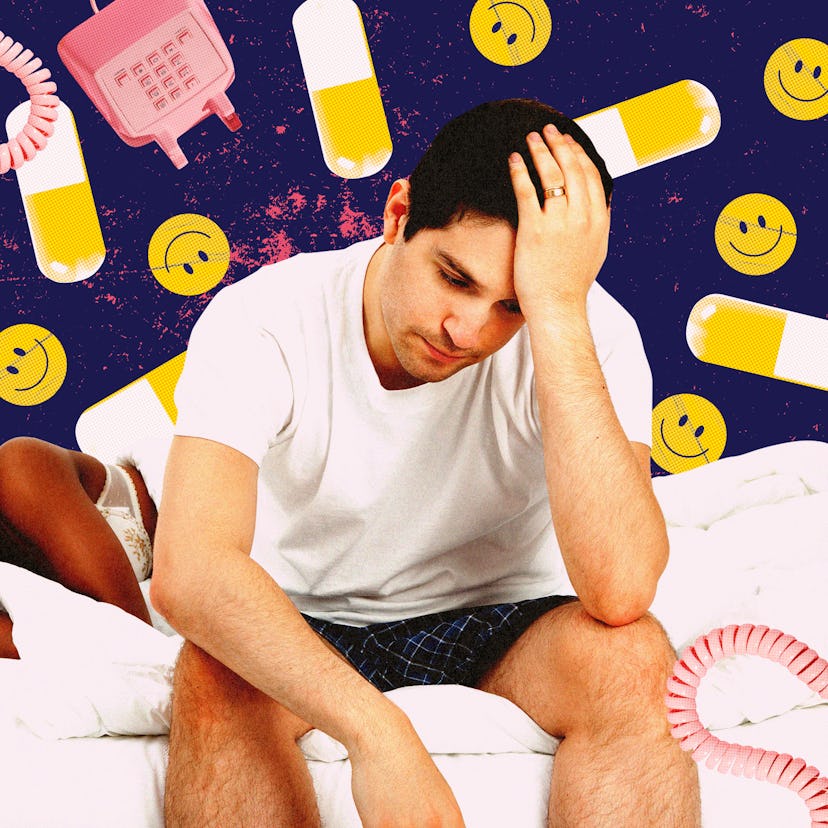My Anti-Depressants Are A Godsend — But They're Wrecking My Sex Life
So... how should I talk about it with my partner?


Welcome to Ask A MWLTF (Yes, that’s Mother Who Likes to F*ck.), a monthly anonymous advice column from Scary Mommy. Here we’ll dissect all your burning questions about motherhood, sex, romance, intimacy, and friendship with the help of our columnist, Penelope, a writer and mental health practitioner in training. She’ll dish out her most sound advice for parents on the delicate dance of raising kids without sacrificing other important relationships. Email her at askpenelope@scarymommy.com.
Dear Penelope,
I’m a married man in his early forties, and a few months ago I started taking an anti-depressant. I prefer not to go into all the specific reasons, though I’m guessing they’re common enough. The point is that I’d been finding life and myself unbearable, and the usual homemade remedies had failed to right me. I decided at last to take my doctor’s advice and lend mother nature a hand. Within three weeks, I was feeling happier and more energized than I had in years. I could think clearly and concentrate. I could keep my anxious thoughts in check. The only thing I couldn’t do, and unfortunately this seems like an important thing, is achieve an orgasm. It came as a shock to both me and my wife who have managed to keep up a healthy sex life despite the demands of work and children. What a strange feeling it was. Like going to reach for a jar in the cupboard and finding I had no arm. So, now what? Sex is not the most important thing to me, but it’s important. I’m not going to live without it for the rest of my life. At the same time, I don’t want to go back to the sad sack I felt I was becoming without meds. Is there some third option? And how can I talk about all this with my wife who has skin in the game, after all?
Signed,
Happy but not Horny
Dear Happy but Not Horny,
As a fellow medicated sad-sack myself, I feel your pain, as do the other 37 million Americans being treated with mood-regulating pharmaceuticals. And yet isn’t it interesting that as common as these medications have become, not all doctors talk openly and honestly with their patients about the common sexual side effects. Even the short-hand term itself “sexual side effects,” rings euphemistic. The first time I heard the term, an image came to mind of adult section of a hotel minibar with its little ramekins of condoms. Why not say it plainly? Many of these drugs will make you not want to have sex. Some will make you unable to come. It’s very possible that for a period of time, cobwebs will proliferate across your marital bed and your crotch will feel about as lively as a block of wood?
On the other hand, these drugs also save lives and change them for the better, as you yourself have seen. And while sexual health is important, untreated depression and anxiety can corrode even the most loving relationships. So where does that leave us? It seems to me you hit on something important in that you ask not “what should I do?” Or “how do I fix this,” but rather, “How do I talk about this?” Talking about it, openly, honestly, precisely, with your doctors, your therapist, and most of all, your partner, seems to me the vital component too often left out.
When we communicate with our doctor about the impact of medication on sexual intimacy, we open the door to the imperfect but essential process of trial and error. Some drugs have greater sexual side effects for certain patients than others. Sometimes doses and timing can be adjusted. The process is never perfect, but a good psychiatrist should work with you to find a regimen that offers you relief of symptoms with minimum impact on sexual function.
Furthermore, as important as it is to talk with your doctor about this too-often taboo subject, it’s equally important to talk with your partner. Even for couples with a thriving sex life, sexuality is not always to discuss. Too often, our culture tells us that sex should be spontaneous, easy, impulsive, and effortless, and if it’s not, it’s a sign that something is off with a relationship. The reality is that sex in a long-term relationship, even without the potential side-effects of psychopharmacology, is far more fluid and complicated. Kids, work, physical illness, a global pandemic — all these things can impact a couple’s sex life. And yet it’s so easy to personalize every rut. When communication is lacking, insecurity blossoms. On the other hand, being able to talk openly with a partner, and doing so with curiosity and empathy rather than criticism or blame, can ultimately make build intimacy and trust. My advice then would be to think of your wife as an ally in the long-game process of balancing your mental and sexual health. Relationship research often shows that couples grow closer when they work on a project together or toward a share goal. I can’t think of a better one to start with than a future where horniness and happiness are in balance.